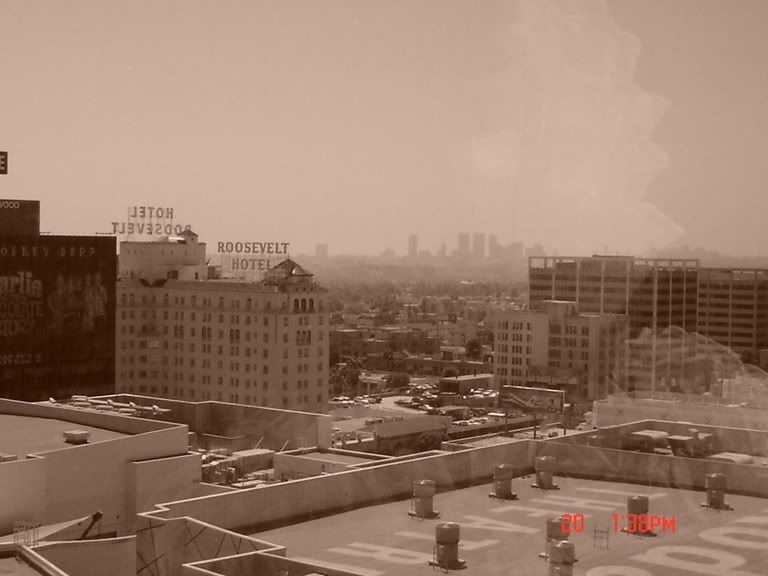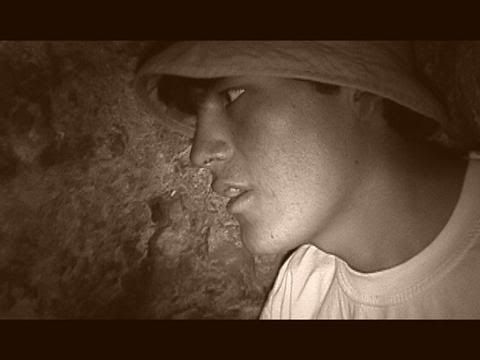LA Sepia Shots
Shot from the Hollywood Renaissnace Hotel, looking southwest, Century City in background:
More to come........
| This Is My Life, Rated | |
| Life: | |
| Mind: | |
| Body: | |
| Spirit: | |
| Friends/Family: | |
| Love: | |
| Finance: | |
| Take the Rate My Life Quiz | |
A blog on channeling my energies to achieve more balance, introspection, progessive living & transgressing.........
Shot from the Hollywood Renaissnace Hotel, looking southwest, Century City in background:
More to come........

Radio Golf, August Wilson’s final in a series of 10 plays chronicling Black life in the US each decade of the 20th century, arrived with much anticipation to the Taper Forum in Los Angeles at the end of July. Noteworthy is Wilson’s success at completing this cycle of plays - the first of its kind by any American playwright. Wilson superbly writes in a style that exemplifies the musical (blues and jazz) and poetic of African Americans cadence. He manages to find this cadence in each character, be they ministers, hustlers, musicians, wise men/women, lay-people, children or upper crust folk. At times in Radio Golf, the text jumps off the script and when executed well, coaxes the audience into listen-mode with one story of identity and history after another.
Set in Pittsburgh's Hill District in the 1990's, the play begins with Mame and Harmond disagreeing on whether he should allow the newspaper to run a quote he made in reference to the police department that may damage his mayoral campaign. Although not readily apparent, Mame and Harmond are married, however, they function somewhat more like a shrewd team of opportunists. Whenever Harmond threatens to veer from the path of political power, Mame attempts to draw him back in with icy logic.
Soon, we meet Roosevelt, Harmond’s best friend and business partner. Together they own and operate the Bedford Hills Redevelopment, Inc. If Harmond is an ambitious, proud black man from ‘good stock’, Roosevelt is that times 10, he’s louder, more boisterous, foolishly ambitious and willing to make any deals as long as they advance HIS name, stature or pocketbook. Roosevelt, being the less refined of the two, has a burgeoning interest in golfing – mostly, it seems, because of the business deals it may allow him. Throughout the play, he and Harmond tune in to the show ‘Radio Golf’ to obtain tips on improving their game. Perhaps symbolic of the disconnection with the community they are hoping to redevelop, this ‘Radio Golf’ show seems of more interest to them than meeting with folks who live in the Hill District to discuss plans and receive input on redevelopment. Sterling Johnson, a friend who remembers Harmond and his family well as being one of the few ‘well-off’ Black families in Pittsburgh, presents an affable streetwise character whose role throughout is to keep it real. Harmond’s disconnection with the people of the community he & Roosevelt wishes to redevelop is apparent again in interactions with Sterling as he looks dumbfounded when Sterling suggests he place lights in the park to attract more people or when he drops the ‘the Black voting population counts symbolically but everybody knows Blacks don’t vote’ line.
Larger questions around the effects or outcomes of integration, definitions of progress, property ownership and the corrupting potential of capitalism hover just above the heads of the actors. It is Harmond, however who comes closest to reconsidering them in the form of the 5th and final character, Elder Joseph Barlow. Barlow enters the play asking for ‘Christian people’ who can help him with a case concerning a mishap with the police. Anthony Chisholm wonderfully portrays Elder Barlow with a technical skill that respects Wilson’s musical and sometimes haunting language. He is at once scary and simple, growling and fatherly, imposing and meek. After doing him a favor, Harmond forges a relationship with Barlow based on trust and perhaps Harmond’s attempt to reach out to ‘real people’. Barlow and Roosevelt are at opposite ends of the pole. However unlike magnets with opposite ends facing each other, they repel each other. Barlow provides the moral plot of the story and takes Harmond on an unexpected journey that eventually leads him to change his priorities (I’m NOT revealing the plot, therefore I’m keeping it general). While this change is communicated to fellow players, the process Harmond underwent to get there was not staged, leaving the audience unfulfilled in understanding his motivations. Indeed, Wilson’s portrayal of Harmond represents perhaps all upwardly mobile African Americans who lose their connection to the African American community in need and does not have even modest access to medical, legal and educational systems necessary for advancement in this country. Are we then to surmise the only possible opportunity for reconnection of upwardly mobile African Americans to African Americans in need is an unexpected emotional epiphany that reminds us ‘we all kin folk’?
The set/stage is lacking in modern conveniences that would have given it a 90s feel. For instance, there was no computer or fax machine, leaving the viewer feeling like this could be set in any of the past 5 decades. The costumes lack versatility with Harmond seeming to remain in the same suit throughout the entire play and Mame only changing from ‘First Lady’ blue and red during her few scenes. All scenes take place in the apparent 1-room office of Bedford Hills Redevelopment, Inc. It felt as if the settings (stage, costume, props) were secondary to the text; there was very little use of props onstage and it is clear that Wilson (or perhaps the scenic design individual) did nothing to show that this was the 1990s besides beyond stating it in the program.
August Wilson's Radio Golf, now through September 18th, 2005 at the Mark Taper Forum, Los Angeles, CA.
AMPULA

I will begin a small photographic series with a focus on digital photos I've taken in Sepia tones. This coming weekend, I'll be taking a road trip to San Francisco to spend some time with my sister who is currently attending a Jazz Intensive at Stanford. This first series will be a 'Sepiaed' reflection of this road trip and that beautiful city by the bay, San Francisco.
Stay tuned!
Posted is a pic I took in '02 of a tour guide in Cuzco, Peru.
Black preachers embrace homosexuality as another of God's works by John in Paris
This is quite interesting. My read of the quotes below is, basically, that "intelligent design" includes gays. This is something I've said before, though not quite in that way. Basically, God doesn't make mistakes. But I love using the intelligent design framework to explain it - hey, maybe we can teach this in schools that include intelligent design? God made me gay and that's okay.
The Rev. James A. Forbes spoke with a joyous righteousness as a preached to a hall of black faces Sunday at a cathedral at the edge of Harlem, and the words he chose might have come straight from the civil rights struggles of the 1960s.Discrimination, he said, has no place in this world, and he urged his audience to liberate themselves from the notion put forward by some that they are less favored by God."Your job is to get up every day and be grateful to God for your DNA," Forbes said. "It took an artist divine to make this design!"
What made his words stand out was that they were spoken to a roomful of gay and lesbian faithful, and the would-be oppressors he referred to during the spirited religious service weren't white segregationists, but the pastors of some black churches....Other speakers included Manhattan Borough President and mayoral candidate C. Virginia Fields, who likened the treatment of homosexuals today to the discrimination she faced growing up black in the old South, and Arun Gandhi, a grandson of Mohandas Gandhi, who drew parallels to the repression once experienced by nonwhite citizens in South Africa.
| This Is My Life, Rated | |
| Life: | |
| Mind: | |
| Body: | |
| Spirit: | |
| Friends/Family: | |
| Love: | |
| Finance: | |
| Take the Rate My Life Quiz | |